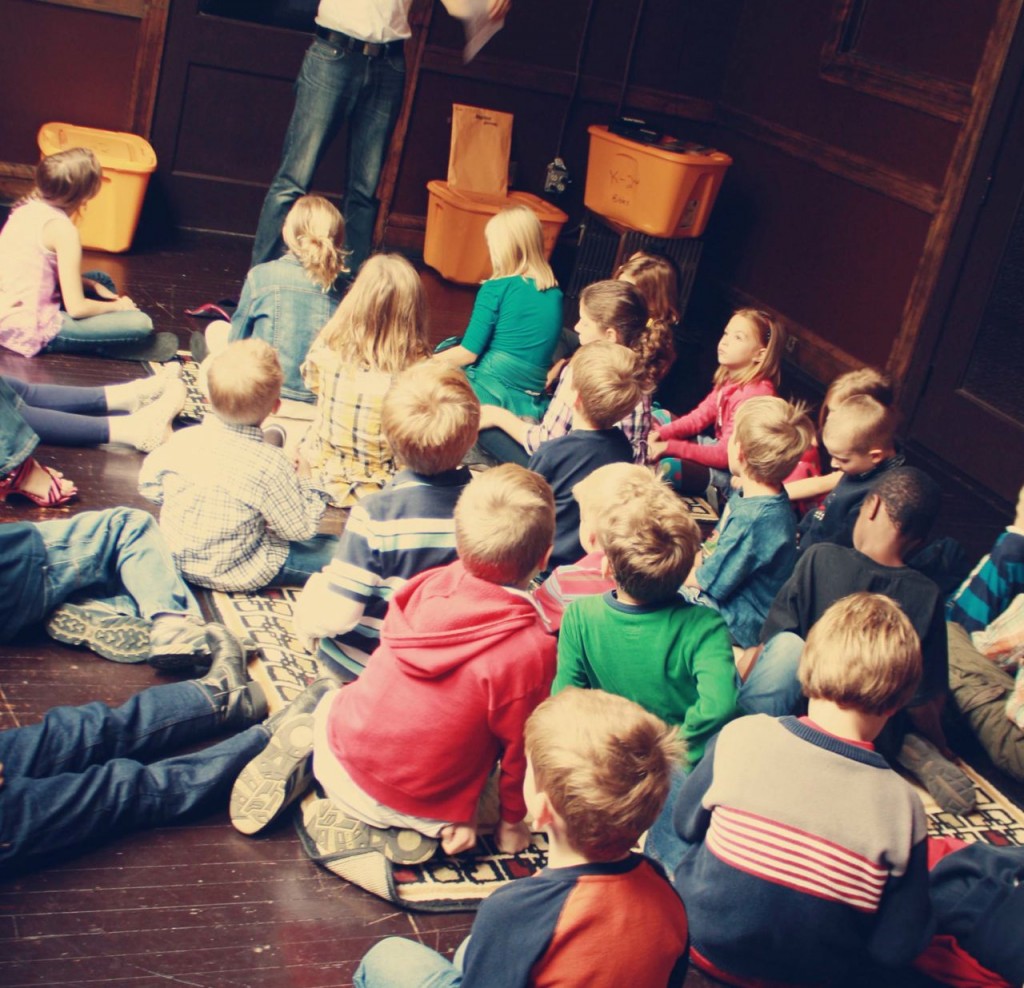
Think of all the “all-ages” events we go to in this life: baseball games, community festivals, museums, parks, shopping, concerts, movies, zoos, many restaurants, and volunteering in the community.
Then there’s church – and in most churches, the first thing parents do when they arrive is check their kids into a parallel universe of Sunday morning worship so the adults won’t be “disrupted” and the kids can have an age-appropriate worship experience.
I get it. Many adults in my generation went to church as kids and sat in the pew next to Mom and Dad and were bored to tears because the service was full of “adult things” (boring songs, lectures, and nothing fun to do). Some of those adults don’t even go to church anymore largely because of that disconnect.
I understand that infants and toddlers need to be privately nursed and cared for where they can cry, crawl, and toddle. I understand that most school-age kids are loud and fidgety and need ways to learn and express themselves in a manner that is different than adults. I’ve been working with kids for over a decade and before that I was one. So having never really left the world of kids in my entire life, I have observed that yes, kids learn and worship differently than adults. But I have also observed that adults could learn a little something about how to worship from kids (Mark 10:15).
And one way to do that is to combine the kids (PreK and up) and adults in worship every once and a while. The other, more important way is to train and instruct parents of kids (of all ages) to lead their kids in worship all week long (not just on Sunday mornings).
I visited Israel years ago and attended an orthodox Jewish synagogue service. I sat and watched as a young boy (4 or 5) stood next to his father and mimicked his every move (the rocking forward and backward in prayer). I could only ponder the importance of kids learning how to worship from their parents in the context of joint worship. Of course, that was simply an outward physical action that was being imitated, but it reflects the principle that kids best learn by being alongside their parents in important settings such as corporate worship.
I really want to believe that there is a way to have intergenerational worship that is actually more kid-driven than adult-driven. Perhaps a church that usually separates the kids and adults could do a once-a-month service or at least once-a-quarter. Currently, our church offers that on special holiday Sundays and once-a-month at our whole-family “First Tuesdays” intergenerational worship services, which I really appreciate.
For intergenerational worship, the adults can (and should, in my opinion) be the ones who adjust to the kids’ worship style rather than the other way around. Didn’t Jesus implore us to have faith like children (Luke 18:17)? Jesus also told us to “welcome” the children because by doing so, we are welcoming God Himself (Luke 9:47).
Though I’ve been pondering this for quite some time, I was inspired to say something here after reading this excellent blog post by Jow Bowen about the subject. She concludes what I already said up front – that the most important thing is parents teaching worship in all things all week long to their children (Deuteronomy 6:4-9). And the church’s role is to support and equip parents to pull that off. There is a stream of good comments on there as well.
Let me know what you think in the comments. How do you feel about kids and adults worshipping together? If you went to church as a child, what was your experience like?




6 responses to “Kids in Church: Children’s Service or Adult Service?”
At our church we have the kids (PreK-5th grade) stay in the main service through worship. Then we have a kids sermon and they go out to Sunday School during the adult sermon. I love that my kids can worship with us and recite the creeds with the rest of the church community. As we drove home from church this past week they were singing the song we sang in worship. We are a smaller church (just under 200) so it’s easier to do something like this.
That’s a common solution (which I like) in many churches, Joel. I do wonder if any churches of 400 or more have been able to pull that off. It seems that the larger the church gets, the less you see the kids in the adult service, unless there is an intentional effort to do otherwise.
Great post Jesse! Glad you are continuing the discussion here! One thought on Sunday School…the model came about in the industrial revolution patterned after public education. I think it’s safe to say our inherited model of public education is broken and is overdue for an upgrade. So is Sunday School.
Kid’s church (all large group) models for faith formation in kids often skimps on connecting kids relationally — both to a group of consistent peers and a consistent leader. volunteers are assigned as helpers who sit and observe rather than have something significant to do or a group of kids to disciple.
Depending on what source you look at, as many as 60-70% of kids are walking away from church when they graduate from high school. so our success rate warrants some serious discussion.
If we are going to reach this generation, we need to connect to them relationally. Check out Fuller’s “flipped ratios” in this article – http://stickyfaith.org/articles/the-church-sticking-together
As for the original discussion on corporate worship — I agree, it makes sense to flip the environment. Introduce parents to the faith of a child, genuinely believe in their potential to influence their children at home, and structure our ministries to foster relationship and a sense of belonging.
Thanks for all the great info, Joy. I’ll look at Fuller’s flipped ratios. You brought up some other topics that warrant their own discussions (like public education reform and inspiring kidmin volunteers to lead and not spectate).
We’ve had to acknowledge the size predicament too. If we grow anymore, it’s hard in terms of safety/security to have the kids come to the front for the kids message and then head out to their classes. The drop-off system is harder the bigger you get and still try to have the kids head out after a kids message without the parents following them out. Maybe that’s why churches should multiply when they reach 400 or so 🙂
Isn’t that what Eugene Peterson supports (multiplying at 250 or so)?